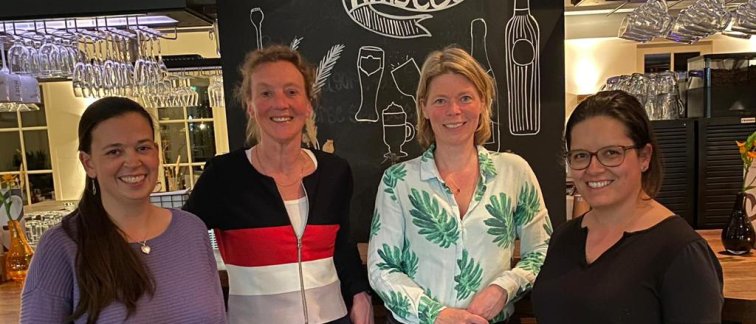The FaMaLE (failing maternal–fetal tolerance in SLE) study is a pioneering research project that is the first in the world to collect living cells from the placenta of women with Systemic Lupus Erythematosus (SLE). This innovative approach is made possible by a newly developed, standardized protocol that allows researchers to simultaneously collect both immune and non-immune cells from the placenta, opening up new avenues for understanding pregnancy complications in SLE.
The idea for the FaMaLE study was born from the observation that women with SLE, despite receiving optimal medical care, still face a high risk of pregnancy complications. Previous research has mainly focused on individual cell types, but it is becoming increasingly clear that the interaction between different placental cells plays a crucial role in these complications. By studying these interactions, researchers hope to uncover the underlying causes and develop better strategies for prevention and treatment.
A collaborative effort
Supported by the Amsterdam UMC Postdoc Bridging Grant, Dr. Wendy Dankers was recruited by Amsterdam UMC to lead the FaMaLE study and establish a new research line focused on the immune system’s role in pregnancy complications in SLE. The multidisciplinary core team consisting of Dr. Wendy Dankers, Dr. Irene Bultink, Dr. Lisa van Baarsen, and Dr. Marjon de Boer, worked closely together to develop the clinical and laboratory protocols. Importantly, two patient research partners were involved from the very beginning, ensuring that the study addresses the real needs and concerns of women with SLE.
Innovative methods and future impact
Although results are not yet available, the FaMaLE study protocol offers a unique method to isolate and analyze both immune and stromal cells from the placenta. This enables researchers to study the complex interplay of cells at the maternal-fetal interface in unprecedented detail. The approach is expected to provide new insights into the causes of pregnancy complications in SLE, which could lead to better prediction, early detection, and potentially new treatments for women with SLE who wish to become pregnant.
For patients, this research means increased attention to their specific risks and a step towards more personalized care during pregnancy.
Broader implications
The protocol developed in the FaMaLE study can serve as a template for other researchers conducting placenta-related studies, not only in autoimmune diseases but also in the general population. By sharing this method, future studies can start more efficiently, ultimately leading to improved care and outcomes for pregnant women with SLE and possibly other conditions.
Looking ahead
With the biosamples and clinical data collected, the team is conducting large multi-omics studies, including proteomics on blood plasma, single-cell RNA sequencing on placental cells, and high-dimensional spectral cytometry on blood cells. Uniquely, in collaboration with Dr. Afink from the Reproductive Biology Lab, two innovative organoid-based models have been developed to functionally study the communication between SLE immune cells and placental cells.
Patient involvement and practical challenges
The involvement of patient partners in the study design has been invaluable, ensuring that the research remains closely aligned with the needs and wishes of the target group. One of the biggest challenges in this project is the collection of placental tissue, which must occur within 1-2 hours after delivery, a process that is often unpredictable and requires a dedicated team of researchers available around the clock.
Conclusion
The FaMaLE study represents a significant step forward in understanding and ultimately improving pregnancy outcomes for women with SLE. By combining innovative science, patient involvement, and practical collaboration, this research sets a new standard for studies in reproductive immunology and beyond.
For more information contact Wendy Dankers (w.dankers@amsterdamumc.nl) or read the scientific publication below:
- Failing maternal–fetal tolerance in SLE (FaMaLE): a prospective cohort study for finding the molecular mechanisms behind pregnancy complications
Amsterdam UMC researchers involved
Wendy Dankers1,2, Postdoctoral Fellow
Jikke F van Ruitenbeek, Research Assistent
Serife Asya Germe1,2, Research Fellow
Agner R Parra Sánchez1, PhD Fellow
Marjolein Hortensius, Master Research Intern
Kyra Cramer, Patient Research Partner
Daphne C Rohrich-Heldens, Patient Research Partner
Marjon de Boer1,2, Gynaecologist
Lisa G M van Baarsen1,3, Associate Professor/Principal Investigator
Irene E M Bultink1,2, Rheumatologist
1Amsterdam Institute for Immunology and Infectious diseases (AI&I), Amsterdam UMC, the Netherlands
2Amsterdam Reproduction & Development research institute (AR&D), Amsterdam UMC, the Netherlands
3Amsterdam Movement Sciences (AMS), Amsterdam UMC, the Netherlands
Funding
The FaMaLE study is managed by Amsterdam UMC and is funded by the FOREUM Foundation for Research in Rheumatology, the Amsterdam UMC Postdoc Career Bridging Grant, the AR&D Open Research Grant, and the NVLE Foundation. No commercial partners are involved in this research.
Image: FaMaLE core-team. From left to right - Dr. Wendy Dankers, Dr. Irene Bultink, Dr. Marjon de Boer, and Dr. Lisa van Baarsen.

